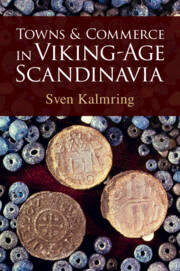Book contents
- Towns and Commerce in Viking-Age Scandinavia
- Additional material
- Towns and Commerce in Viking-Age Scandinavia
- Copyright page
- Epigraph
- Contents
- Plates
- Figures
- Maps
- Acknowledgements
- Abbreviations
- Maps
- 1 Introduction
- 2 The Viking-Age Town
- 3 The Viking World
- 4 Cult, Jurisdiction and Markets
- 5 Local Society and Viking-Age Towns
- 6 An Urbanisation Based on Harbours
- 7 Jurisdiction and Taxes
- 8 Free Trade within Narrow Boundaries
- 9 Special Economic Zones of Their Time
- 10 Development after the Inception Phase
- 11 Discussion: Hedeby’s Abandonment and the Foundation of Slesvig
- 12 Summary and Conclusions
- References
- Index
- Plate Section
10 - Development after the Inception Phase
Published online by Cambridge University Press: 04 January 2024
- Towns and Commerce in Viking-Age Scandinavia
- Additional material
- Towns and Commerce in Viking-Age Scandinavia
- Copyright page
- Epigraph
- Contents
- Plates
- Figures
- Maps
- Acknowledgements
- Abbreviations
- Maps
- 1 Introduction
- 2 The Viking-Age Town
- 3 The Viking World
- 4 Cult, Jurisdiction and Markets
- 5 Local Society and Viking-Age Towns
- 6 An Urbanisation Based on Harbours
- 7 Jurisdiction and Taxes
- 8 Free Trade within Narrow Boundaries
- 9 Special Economic Zones of Their Time
- 10 Development after the Inception Phase
- 11 Discussion: Hedeby’s Abandonment and the Foundation of Slesvig
- 12 Summary and Conclusions
- References
- Index
- Plate Section
Summary
As shown in the previous chapters, only a juxtaposition of the local, traditional Viking-age societies with the innovative, largely detached cosmopolitan Viking-age towns may help to resolve the seemingly incompatible scholarly views of the Scandinavians as ‘brutal Vikings and gentle traders’ (Staecker 1997). This ambivalence is not so much a question of two sides of the same coin but instead represents two very different phenomena that need to be treated separately in future Viking-age research (see also Hillerdal 2009: 253). Apart from this appeal to the research community, another frequent inaccuracy also needs to be addressed when discussing early Scandinavian urbanisation: for far too long, Viking-age towns have been perceived as monolithic entities, a perception that neglected their considerable chronological depth of up to 250 years, suggesting dynamically changing conditions rather than static idleness. In fact, a few scholars reached and shared this insight several decades ago, as they tried to tackle this very problem: Hodges (1982: 50–2) introduced development phases, which discerned between type-A (seasonal beach markets), type-B (classical emporia) and type-C emporia (regional administrative centres).
- Type
- Chapter
- Information
- Towns and Commerce in Viking-Age Scandinavia , pp. 147 - 186Publisher: Cambridge University PressPrint publication year: 2024

